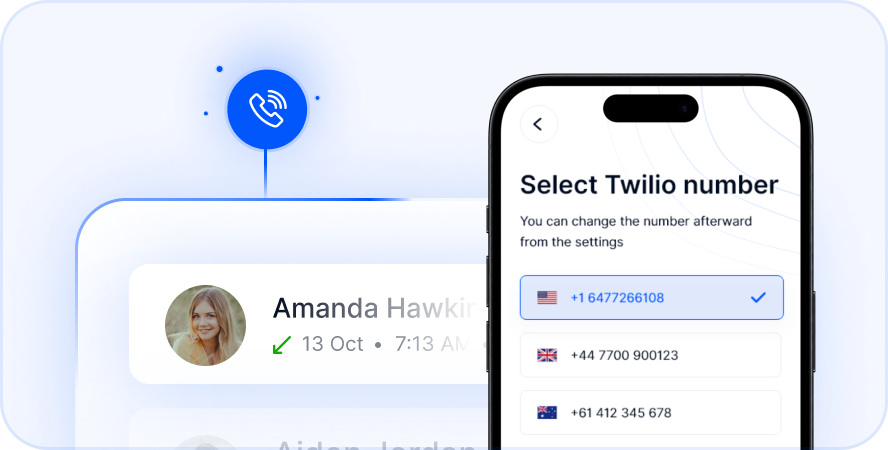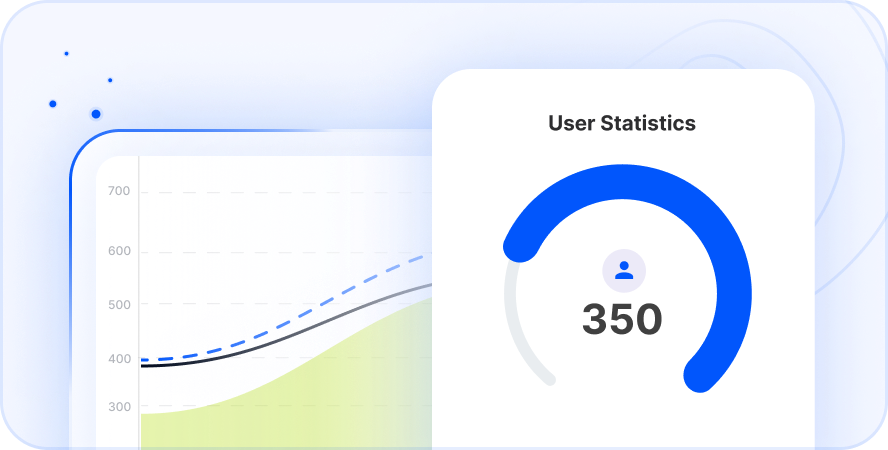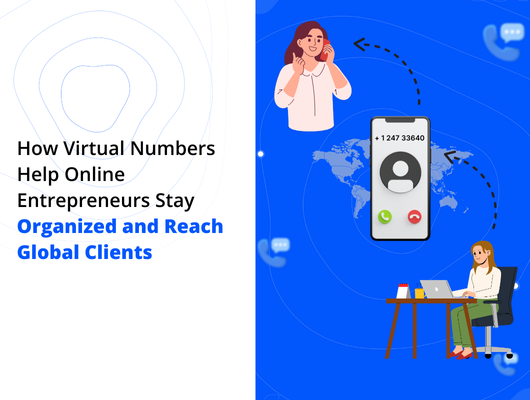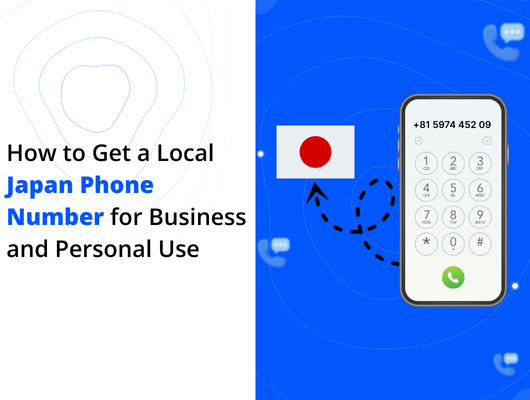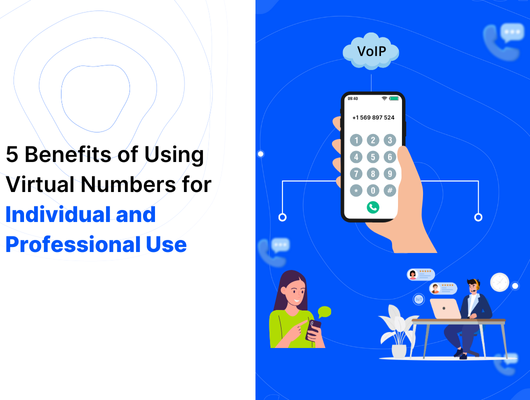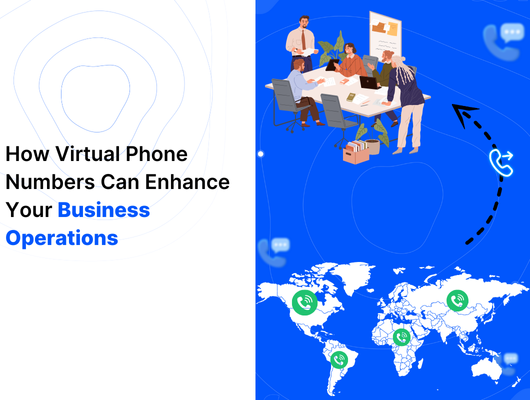
Cloud telephony is changing how businesses connect with people. It’s more than just making calls. This technology lets you talk using the internet instead of old phone lines. This shift is creating new ways for companies to reach customers. It helps marketing teams build stronger connections. They can make messages feel more personal and run campaigns based on solid information.
This blog post looks at how cloud telephony fits into modern marketing. We will see how it helps you talk to customers better. We will also explore how it makes your campaigns work well and feel more personal. Using cloud telephony can give your marketing a big boost. According to Statista, the global Voice over IP (VoIP) market is expected to keep growing significantly, showing more and more businesses see the value in internet-based communication.
What is Cloud Telephony?

Cloud telephony uses the internet for phone calls. It is also known as VoIP, which stands for Voice over Internet Protocol. Instead of phone cables, it uses your internet connection. This technology offers many advantages for businesses.
Think of it like using a messaging app for calls, but for your business phone system. It allows you to make and receive calls from anywhere with internet access. This flexibility is great for businesses with remote workers or multiple locations. It also makes it easy to grow your phone system as your business grows. Unlike traditional systems, you do not need bulky equipment. Everything is managed online, often through a simple dashboard.
Why Cloud Telephony Matters for Marketing
Bringing cloud telephony into your marketing plan is a smart move. It helps you stand out from the competition. With cloud telephony, your marketing team can talk to leads and customers right away. You can also improve the help you give them. Importantly, it gives you data about calls. This data helps you run campaigns that are more focused and effective.
Here’s how cloud telephony becomes a key part of your marketing strategy:
- Faster Responses: Customers expect quick answers. Cloud telephony helps you connect instantly. This can turn a lead into a sale faster.
- Better Customer Service: Happy customers often become loyal customers. Good communication makes them feel valued.
- Data-Driven Decisions: Call details provide valuable insights. You can learn what works and what does not. This helps you spend your marketing money wisely.
Cloud telephony changes how marketers work. It moves communication from a simple task to a powerful tool for growth.

Key Benefits of Using Cloud Telephony in Marketing
Cloud telephony offers several direct benefits for your marketing efforts. These advantages help improve how you connect with people and reach your goals.
1. Enabling Real-Time Engagement
Responding quickly is vital in today’s fast world. When someone shows interest in your business, they are often ready to talk now. Cloud telephony makes this possible. It allows your sales or customer service team to handle calls right away. This reduces how long people wait. Shorter wait times usually mean happier customers.
For example, if someone clicks on a “Call Now” button in an online ad, cloud telephony can route that call instantly to the right person. This ensures the lead is contacted while their interest is high. Prompt follow-up calls after a website inquiry or event are also easier. You can use the system to make sure every potential customer gets a quick call back.
2. Personalization Through Call Insights
Making your marketing feel personal is important. Cloud telephony provides information that helps you do this. It tracks details about calls. This can include how long a call lasted, where the caller was, or how many times they called before. This information helps you understand each customer better.
You can use call data to learn about customer needs and interests. This helps you group your audience more effectively. Then, you can send messages or make calls that are tailored to them. Knowing a customer’s call history allows your team to have more relevant conversations. They can pick up where the last call left off, making the customer feel understood and valued.
3. Efficient Call Routing and Lead Distribution
Losing leads because calls go unanswered or to the wrong person is frustrating. Cloud telephony solves this with automated call routing. It sends incoming calls to the best person or team automatically. This is extremely helpful for marketing campaigns. Every call could be a new lead or a chance to make a sale.
You can set up rules for routing calls. For instance, calls from a specific marketing campaign might go to a dedicated sales team. Calls from existing customers might go to customer support. This ensures inquiries are handled by the expert who can best help. Automated routing prevents leads from being missed. It also makes sure each call is handled promptly and by the right person.
4. Expanding Reach with Virtual Numbers
If your business targets customers in different cities or countries, cloud telephony is a powerful tool. It allows you to use virtual phone numbers from around the world. This means you can have a local presence without needing a physical office there. Customers feel more comfortable calling a local number.
Having virtual numbers in various regions helps you connect with audiences globally. It avoids high international calling costs for both you and your customers. You can use different virtual numbers for different marketing campaigns in various locations. This helps you test which areas respond best. It increases your reach and potential customer base without requiring a large budget for international infrastructure.
Integrating Cloud Telephony into Marketing Workflows
Cloud telephony works well with other tools your marketing team already uses. Connecting it with systems like CRM (Customer Relationship Management) and marketing automation platforms creates a smooth process.
1. CRM Integration for Better Lead Management
Connecting your cloud phone system with a CRM is a game-changer. Tools like Salesforce or HubSpot can link directly. When a call comes in, the system can show the caller’s contact information from your CRM. Your team knows who is calling before they even answer.
This integration automatically logs call details in the customer’s CRM profile. You can see call history, notes from conversations, and follow-up tasks all in one place. It helps sales and marketing teams keep track of every interaction. This leads to better lead nurturing and more informed sales pitches. It makes managing your leads much more efficient and data-driven.
2. Using Analytics for Campaign Optimization
Cloud telephony provides valuable data about your calls. This includes how many calls each campaign generates. You can see which marketing efforts are driving phone inquiries. For example, you can link specific phone numbers to different ads or landing pages. Then, you can track which source leads to the most calls or conversions.
Analyzing this call data helps you understand campaign performance. You can see call duration, outcomes, and trends. This information shows you which campaigns are working well. It also highlights areas that need improvement. Using these insights, you can refine your targeting, messaging, and spending. This helps you get a better return on your marketing investment.
3. Enhancing Outreach with SMS and Voicemail
Cloud telephony systems often include more than just voice calls. They can also support SMS messaging and automated voicemail drops. These are effective ways to reach out to leads and customers.
Sending personalized text messages can be a quick way to follow up after a call or inquiry. You can send reminders, special offers, or quick answers. Voicemail drops allow you to leave pre-recorded messages in someone’s voicemail inbox without their phone ringing. This is useful for sending broadcast messages to many leads or customers efficiently. Using SMS and voicemail adds more tools to your marketing toolkit, helping you stay connected and nurture relationships.
Practical Ways to Use Cloud Telephony in Marketing Campaigns
Let’s look at specific ways you can put cloud telephony to work for your marketing.
1. Running Call-Focused Advertising
Many people prefer calling a business, especially for complex questions or high-value purchases. Cloud telephony makes it easy to include phone calls in your ads. You can use specific phone numbers or extensions for different campaigns. This is perfect for ads on platforms like Google Ads, social media, or print materials.
By using unique numbers, you can track which advertisements generate calls. This helps you measure the effectiveness of each ad campaign. You can see which headlines, images, or offers lead to the most phone inquiries. This allows you to allocate your advertising budget more effectively. You can focus on the campaigns that bring in the most valuable calls.
2. Boosting Customer Success Programs
Keeping your existing customers happy is key to long-term business growth. Cloud telephony helps your customer success team connect with customers proactively. They can make timely check-in calls. They can also provide instant support when customers call in with questions or issues.
Call data helps your customer success team understand customer history and potential needs. They can see past interactions before making a call. This allows them to offer more personalized support. Proactive calls can help identify potential problems before they cause a customer to leave. This focused approach to customer communication helps improve retention and loyalty.
3. Automating Follow-Ups and Reminders
Following up with leads and customers consistently can be challenging. Cloud telephony can automate some of this work. You can set up automated calls or SMS reminders based on specific triggers.
For example, you could set up an automatic call reminder a few days before a scheduled demo. Or you could send an automated SMS follow-up a day after a lead downloads a resource. These automated steps help ensure no lead falls through the cracks. They keep your brand visible and help move prospects through your sales funnel efficiently. Automation saves time for your team, allowing them to focus on high-value interactions.

Choosing the Right Cloud Telephony Solution: Consider Telfon
When selecting a cloud telephony provider, you need a solution that fits your marketing needs. Telfon is a strong option designed to help businesses connect with audiences effectively.
Telfon offers features that support diverse marketing strategies. It supports international calls to over 180 countries. This helps you reach global customers without high costs. Key features for marketers include call tracking, SMS capabilities, and WhatsApp integration. You can even manage multiple WhatsApp accounts. Telfon also allows you to use multiple country numbers at once.
Telfon is built for both large businesses (B2B) and consumer-focused companies (B2C). Business plans include user analytics, dashboard filters, and phone number management. These features help you monitor performance and manage your communication resources. You can also get call and SMS history reports for individual users. Telfon supports integrations with your existing CRM and marketing tools.
With over 30,000 users and 600+ companies globally, Telfon offers a reliable service. Its pay-as-you-go pricing means you only pay for what you use. This can offer significant cost savings. Telfon is available on Google Play, the App Store, and Chrome Web Store, making it accessible on various devices.
Getting Started with Cloud Telephony for Your Marketing
Ready to use cloud telephony to improve your marketing? Here are the steps to begin:
- Define Your Goals: First, decide what you want to achieve. Do you need faster lead response? Better customer support? More personalized calls? Clear goals help you choose the right features and measure success.
- Select a Provider: Look for a cloud telephony solution that meets your needs. Check features, pricing, scalability, and integration options. Solutions like Telfon offer a range of tools suitable for marketing.
- Set Up Integrations: Connect your new phone system with your CRM, marketing automation platform, and analytics tools. This links your communication data with your customer data. It creates a more powerful and automated workflow.
- Train Your Team: Make sure your marketing and sales staff know how to use the system. Teach them how to make calls, track data, and use the various features. Proper training ensures you get the most value from the technology.
- Monitor and Improve: Use the analytics provided by the system. Track call volumes, conversion rates, and other metrics. See what’s working and what’s not. Use this data to refine your campaigns and improve your communication strategies over time.

Frequently Asked Questions
Here are answers to some common questions about using cloud telephony for marketing.
Q1: Is cloud telephony expensive for marketing?
A: Generally, cloud telephony can be more cost-effective than traditional systems. It often has lower setup costs and scalable pricing. You can add or remove lines easily as your needs change. Many providers offer pay-as-you-go options, which can be budget-friendly.
Q2: How does cloud telephony handle high call volumes during campaigns?
A: Cloud systems are designed for scalability. They can handle a large number of calls at once. Features like automated routing and call queuing help manage high volumes efficiently. You can easily increase capacity during busy periods.
Q3: Can I integrate cloud telephony with any CRM or marketing tool?
A: Most modern cloud telephony providers offer integrations with popular business tools like CRMs, helpdesks, and marketing platforms. It’s important to check the provider’s list of supported integrations to ensure compatibility with your existing systems.
Q4: How secure is cloud telephony for customer data?
A: Reputable cloud telephony providers use strong security measures to protect your data and communications. This includes encryption and secure data handling practices. Always choose a provider with robust security policies.
Q5: Can cloud telephony help track ROI for specific marketing channels?
A: Yes, definitely. By using unique virtual numbers or tracking codes for different channels (like a specific website page, a print ad, or a landing page), you can see exactly which channels generate phone calls. Combining this with conversion tracking helps you measure the return on investment for each source.
Conclusion
Cloud telephony is becoming essential for modern marketing. It moves beyond basic calls. It provides tools for faster, more personal, and data-rich communication. By enabling real-time engagement, improving personalization, and connecting with your other marketing tools, cloud telephony boosts your strategies and drives results.
Embracing this technology can transform how you connect with leads and customers. It helps you build stronger relationships and achieve your marketing goals. Cloud telephony is a strategic asset that brings powerful, data-driven communication to the heart of your business success. The future of effective marketing relies heavily on these advanced communication methods.



